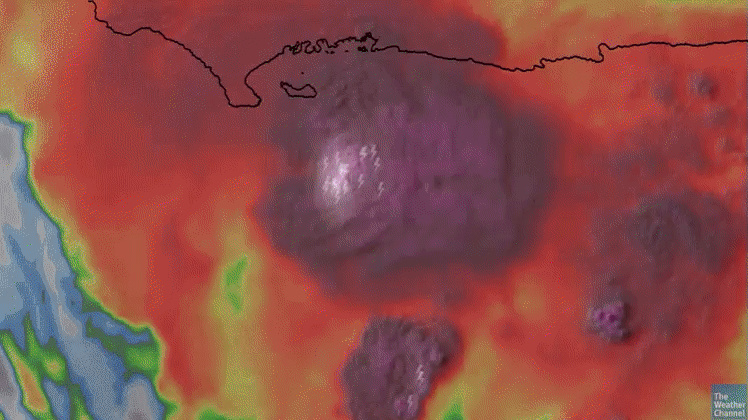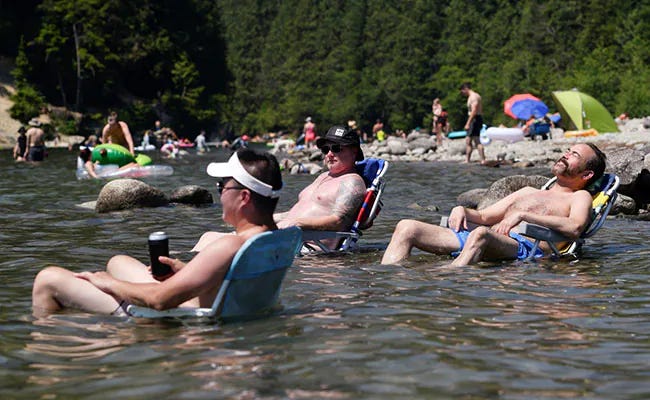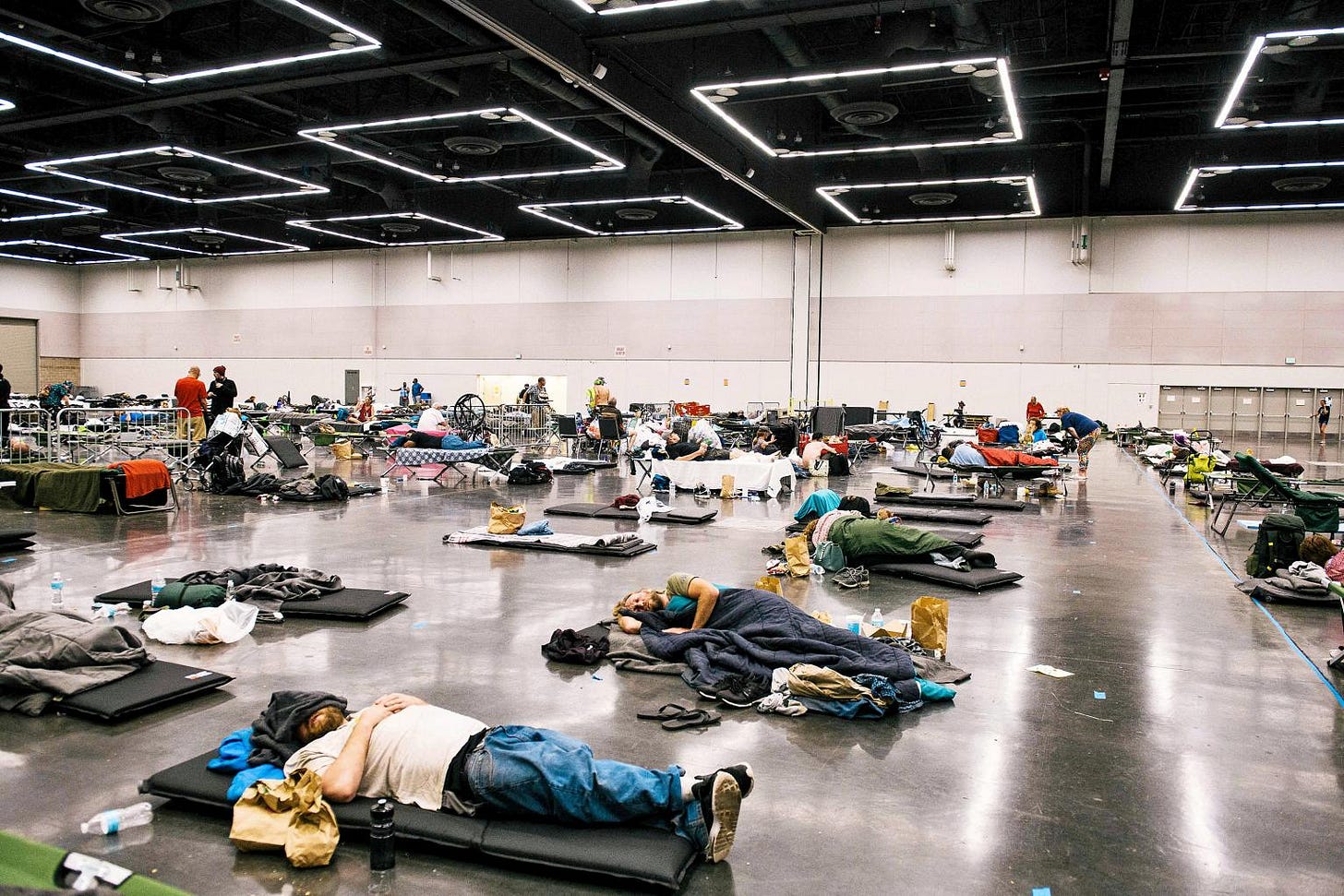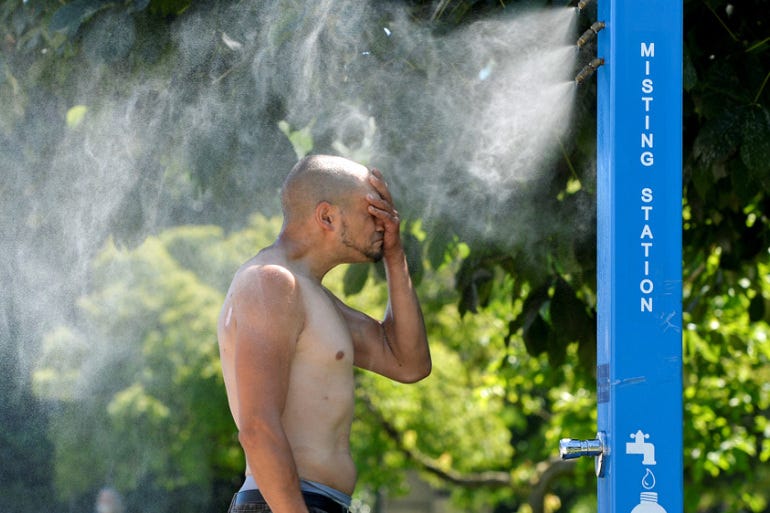🌱 The Grumpy Optimists #17
Record temperatures in Canada, how do we communicate climate change? That and more on this week's episode of the Grumpy Optimists.
Happy Monday all,
There is a small dose of reality for the Grumpy Optimists this week. Despite both being double vaxxed, Will has tested positive for covid and George is having to isolate too. Not the most ideal situation but we're very grateful to be vaccinated and not having to worry as much. Your flower and chocolate deliveries will be much appreciated, thank you. 🙏
Despite our not so difficult circumstances, there is still news to bring to you all. The world has not stopped, so neither shall we. With that being said, we've wrapped up the best and worst of last weeks news with some great reads and a quick watch. But first, let's dig a little deeper into some of the key events from this week, it's been a bit crazy. Get yourself a coffee, a bowl of porridge and enjoy.
Deep dive - why climate change matters to everyone
Will and I both started this blog as a way to write about climate change and to try and provide solutions and an optimistic mindset to the problems we face, however, this week our optimism has been really challenged. We feel the need to dig a little deeper into some of the key events and try and draw some lessons.
One of our first blog posts looked at how we can reshape the climate action narrative to bring everyone along for the journey. There are two key events that have happened over the last few weeks that help us build the narrative of why climate change can impact everyone.
Record Temperatures in Canada
If you weren't already aware, there has been an extraordinary heatwave occurring in the Pacific North West with temperatures exceeding averages by 20 degrees Celsius, reaching 49.6C in the town of Lytton. The rise in temperatures is caused by a 'heat dome', a pocket of air that has only a 1 in several thousand chance of happening. The extreme heat has resulted in up to 500 people dying as many look to take refuge at a public cooling centre.
credit: Weathermodels.com
Why it matters?
Well, to start, people are dying, homes are being burnt down and critical infrastructure is collapsing under the unprecedented heat, boosted by climate change. When people talk about global warming as a good thing, with common quotes in the UK being, 'I wouldn't mind it being a couple of degrees warmer' they miss the fact that we're guaranteed to see more and more extreme weather events. On the map above you can see that while temperatures were 40F higher in the North-West, they were also 24F less in other parts of America. Extreme weather events will become the norm, not the exception, and the devastation shows the pressing need for action.
What is the impact of imagery being used?
One of the most important lessons the heatwave has taught us is nothing to do with the event itself but the way it is communicated and the imagery that is used to frame it. There are two different routes that the media have looked to go down, each creating a stark contrast in how we are made to feel and act about the rise of extreme weather. The two different routes highlight the difference that wording and imagery can have in getting people behind a cause.
Route 1 - glorious sunbathing and relaxation. ⛱️ 🕶️
Route 1 is in our opinion a highly ignorant way to frame an extreme weather event killing hundreds and threatening the lives of thousands more. Importantly, it's an incredibly poor way to communicate the threat of the situation and helps build the rhetoric of 'I wouldn't mind a bit of global warming’. it provokes a passive event where you can just get on the tins.
Route 2 - emergency, fear and upheaval to life. 🚑 🔥
Route 2 is likely a more accurate way of portraying the disaster that the Northwest fire is. The imagery looks to build on the frustration and exhaustion of the people dealing with the heat. It's also a powerful tool to make people aware that while they may be in a nice house now, everyone is one disaster away from sleeping on the floor of a school hall.
What about the Miami building collapse?
The Miami building collapse is another stark reminder of how quickly circumstances can change, especially when climate change and the powerful force of nature is involved. If you're not already familiar, a 12 story condo building in Miami collapsed this week prompting questions over the role of climate change. The disaster highlights the precarious nature of building and maintaining apartments in areas threatened by rising sea levels.
Graphic: Reuters, Guardian. Source: Building outline drawn from Google Earth satellite image; Photo courtesy of Miami-Dade Fire Rescue
What lessons can we learn from both these disasters?
The key lesson we can take from both the Miami building collapse and the extreme heatwave in the Pacific NW is that climate change matters, it's going to impact everyone and that the way we communicate it is absolutely crucial. When it comes to people agreeing with climate policies, it has to be a no brainer. So, if any good can come from the events of this week, hopefully, it's that more people are realising climate change is here to stay, it will directly affect them and that we have to start taking serious action.
Well, after that rather long start to your Monday, let's get on with a couple of quick reads, a video and then cracking on with those emails.
Articles to read
🔥 The Gulf of Mexico is on fire, yes, the ocean is on fire. A burst gas pipe feeding an oil rig caused a hellish scene on Friday with water literally being on fire. The dystopian video has become the centre of attention on Twitter. If you haven't seen it already. Have a look 👇
😡 BBC removes a bitesize page claiming the benefits of climate change. The BBC came under a lot of stick week for talking about the checks notes benefits of climate change. Such as the ability to access more oil and gas and that some animals will thrive. Seriously?! The memes however have been great.👇
🦗 Grasshoppers overwhelm western US. It's bad news for the west coast of the US, with fires, heatwaves and drought, Grasshopper swarms are being added to the mix as they devour any grassland and crops in their way.
💳 The green revolution is set to cost motorists hundreds. In a classic The Times esq take, they emphasise the impact of extra costs at the pump as a reason to hate climate action. While the narrative is frustrating, it does highlight the need to see how climate action is perceived by the whole nation, not just Guardian readers.
😃 Beavers to be reintroduced to London. In one of the only wins for Tottenham beavers will be reintroduced to North London, an area well suited to beavers for us it's marshland. At least we can end on a happier note, gosh that was depressing?
Videos to watch
Finally, you made it, here is our last bit of content for the week, a really cool video breaking down climate change. It’s the first in the series from Jack Harries and the crew at Earthrise Studio, I’m pretty excited about the rest of them!
Enjoy the week all, the next time you hear from us England may well be the European champions. It is in fact coming home.
George and Will 💚











